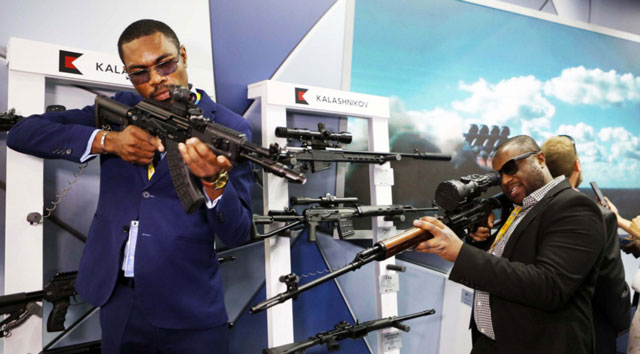
Arms tracking data shows why 17 African countries could have abstained in a UN vote to condemn the superpower
Kampala, Uganda | IAN KATUSIIME | A new report by the Stockholm International Peace Research Institute (SIPRI), an organisation that tracks arms trade, indicates that Russia was the largest supplier of weapons for African countries for the period ranging from 2017-2021. Russia’s weapons sales to Africa accounted for 44% of imports of major arms to the continent followed by the US (17%), China (10%) and France (6.1%).
The SIPRI report offers insights on why 17 African countries could have voted to abstain during an emergency meeting by the UN General Assembly that passed a resolution to condemn the Russian invasion of Ukraine in February. However the SIPRI data showed that there was a general drop on what African governments are spending on defence.
“The overall drop in African arms imports was mainly due to decreases in imports by Algeria and Morocco—the two largest arms importers in the region,” the report stated on its Africa section. In the same period, 2017–202, Algeria accounted for 44 per cent of total African arms imports and for 2.6 per cent of the global total.
The report shows that countries in Sub-Saharan Africa are bottom of the pile when it comes to the arms trade. A measly 2% is what the 46 countries in the ‘sub-Saharan Africa’ region account for in the total global arms trade.
The new data shows that countries like Nigeria, South Africa, Kenya, and to a lower extent; Uganda; the fastest growing countries in the often cited sub region in Africa, are even importing less arms than they were shipping in ten years ago.
“Taken together, their arms imports were 35 per cent lower in 2017–21 than in 2012–16,” the SIPRI factsheet says. Some of the conflicts wrecking the continent had a bearing on their nation’s imports.
“In 2017–21 the five largest arms importers in the sub-region were Angola, Nigeria, Ethiopia, Mali and Botswana. Recently imported arms played a role in the current armed conflicts in three of these states: Nigeria, Ethiopia and Mali. In 2017–21 these three states each had a diversified supplier base and received no more than 49 per cent of their major arms from a single supplier.”
Nigeria has been fighting Boko Haram insurgents in the northern parts of the country while Ethiopia has been at war with its Tigrayan region for more than a year. On the other hand, Mali has gone through a series of coups and instability while Boko Haram militants have also sheltered in its territory. The outlier seems to be Botswana because Angola has always been cited among the most powerful militaries in Africa.
 The Independent Uganda: You get the Truth we Pay the Price
The Independent Uganda: You get the Truth we Pay the Price





